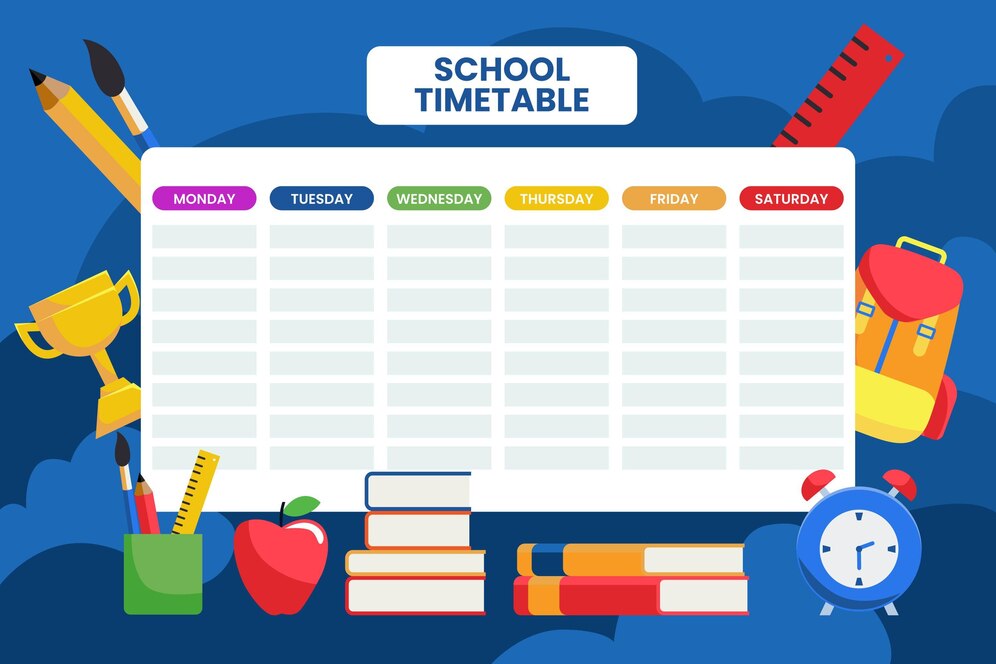How to create a Study Time-Table for Board Exam?

Strong 8k brings an ultra-HD IPTV experience to your living room and your pocket.
Board exams are a crucial milestone in every student’s academic journey. A well-structured study timetable can significantly enhance efficiency, minimize stress, and maximize retention. If you’re preparing for your board exams, a strategic approach to studying can make all the difference.
At Doon Word School, the best CBSE school in Dehradun, we emphasize time management and structured learning to help students achieve academic excellence. This article will guide you through creating an effective study timetable for board exams.
Why is a Study Timetable Important?
Boosts Productivity: A timetable helps you utilize time effectively and prevents last-minute cramming.
Reduces Stress: A planned approach allows for better coverage of subjects, reducing exam anxiety.
Enhances Focus: Knowing what to study and when helps maintain concentration and avoid distractions.
Ensures Consistency: Regular study sessions improve retention and understanding.
Creates a Balanced Routine: A well-planned timetable accommodates breaks, leisure activities, and sleep.
Steps to Create an Effective Study Time-Table
1. Understand Your Syllabus
Before creating a timetable, analyze the complete syllabus for each subject. Identify:
Topics with higher weightage
Subjects that require more attention
Subjects or topics you find difficult
The marks distribution for each subject
CBSE board exams require a deep understanding of concepts rather than rote learning, so prioritize conceptual clarity.
2. Set Clear Goals
Set SMART (Specific, Measurable, Achievable, Relevant, and Time-bound) goals. Instead of saying, “I will study Mathematics,” set a goal like, “I will complete Coordinate Geometry from NCERT in two hours.”
3. Allocate Time Based on Subject Difficulty
Different subjects require different amounts of time. Divide subjects into three categories:
Difficult Subjects (Mathematics, Physics, etc.) – Allocate more time.
Moderate Subjects (Biology, Chemistry, etc.) – Allocate a balanced amount of time.
Easy Subjects (English, Hindi, etc.) – Allocate less time, but don’t ignore them.
For example, if you study for 6 hours daily, you can divide it as follows:
2.5 hours for difficult subjects
2 hours for moderate subjects
1.5 hours for easy subjects
4. Plan Study Sessions with Breaks
Use the Pomodoro Technique (study for 50 minutes and take a 10-minute break) to maintain focus. Avoid continuous study sessions as they lead to fatigue.
5. Include Revision Time
Revision is crucial for long-term retention. Allocate time for:
Daily revision (10-15 minutes per subject)
Weekly revision (going through key topics)
Monthly revision (full syllabus review)
6. Incorporate Practice and Mock Tests
Solve previous years’ question papers
Take mock tests regularly
Practice sample papers to improve speed and accuracy
7. Make Time for Physical Activities and Relaxation
Engage in physical activities like yoga, walking, or sports to stay physically and mentally fit. Ensure you get 7-8 hours of sleep to retain what you study effectively.
8. Stay Flexible and Adapt
A rigid timetable may not always work. Adapt your schedule based on progress and weak areas. If a subject requires more attention, adjust your timetable accordingly.
Sample Study Timetable for Board Exam Preparation
Weekday Schedule:
Time Slot
Activity
6:00 AM – 6:30 AM
Wake up and freshen up
6:30 AM – 7:00 AM
Light exercise/yoga
7:00 AM – 8:30 AM
Study Subject 1 (Difficult)
8:30 AM – 9:00 AM
Breakfast and relaxation
9:00 AM – 10:30 AM
Study Subject 2 (Moderate)
10:30 AM – 10:45 AM
Short break
10:45 AM – 12:15 PM
Study Subject 3 (Easy)
12:15 PM – 1:00 PM
Lunch and rest
1:00 PM – 2:30 PM
Revision of previous topics
2:30 PM – 3:30 PM
Practice question papers/mock tests
3:30 PM – 4:00 PM
Break (leisure activity)
4:00 PM – 5:30 PM
Study Subject 4 (Difficult)
5:30 PM – 6:00 PM
Evening snack and rest
6:00 PM – 7:30 PM
Study Subject 5 (Moderate)
7:30 PM – 8:00 PM
Dinner
8:00 PM – 9:00 PM
Light revision/notes preparation
9:00 PM – 10:00 PM
Relaxation (reading, music, etc.)
10:00 PM
Sleep
Weekend Schedule:
Saturday: Full-length mock test + review mistakes
Sunday: Relaxation + revisiting weak topics
Additional Tips for Effective Studying
Use Mnemonics and Flashcards: Helps in memorizing facts and formulas.
Group Study: Discussing topics with friends improves understanding.
Stay Hydrated and Eat Healthily: Good nutrition boosts brain function.
Avoid Procrastination: Stick to the schedule and eliminate distractions.
Conclusion
A well-structured study timetable is key to acing board exams. It enhances focus, ensures systematic learning, and reduces stress. At Doon Word School, the best CBSE school in Dehradun, we encourage students to follow disciplined study routines to achieve academic excellence.
Note: IndiBlogHub features both user-submitted and editorial content. We do not verify third-party contributions. Read our Disclaimer and Privacy Policyfor details.


